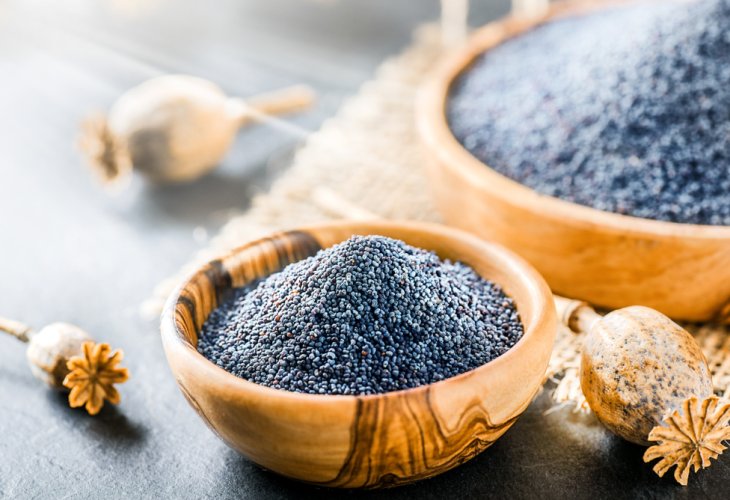Unlocking the Power of Poppy Seeds: Health Benefits and Delicious Recipes
Poppy seeds aren't just for Purim! These tiny seeds boast impressive health benefits like aiding weight loss, promoting better sleep, heart health, and packing fiber. Discover the perks of poppy seeds along with two simple and tasty recipes.
 Illustration
IllustrationDuring Purim, we often remember the delightful taste of poppy seeds, thanks to the classic hamantaschen generously filled with the rich sweetness of these black seeds.
Poppy seeds, derived from the opium poppy plant, have been used for centuries as a food supplement and in medicine production. Despite their small size, these seeds offer a variety of health benefits—from bolstering the immune system to supporting heart health. Here are some standout benefits of poppy seeds:
1. Supports Sleep and Relaxation
Poppy seeds include compounds like tryptophan and magnesium, which have calming effects on the nervous system and may aid in relaxation and improve sleep quality. Including poppy seeds in your dinner might enhance sleep and reduce insomnia symptoms.
2. Rich in Dietary Fiber
Dietary fiber is essential for digestive health and maintaining regular bowel movements. Poppy seeds are a good source of fiber, which helps prevent constipation, promotes bowel health, and may lower the risk of digestive disorders like diverticulitis.
3. Antioxidant Properties
Poppy seeds contain antioxidants, such as polyphenols and flavonoids, which help neutralize harmful free radicals in the body. These antioxidants may reduce the risk of chronic illnesses, including heart disease, cancer, and diabetes.
4. Heart Health
Research indicates that consuming poppy seeds may support heart health by lowering cholesterol levels and reducing inflammation. The omega-3 fatty acids present in poppy seeds can diminish the risk of cardiovascular diseases, such as heart attacks and strokes.
5. Improves Cognitive Function
Rich in vitamin B1 (thiamine), poppy seeds support brain health and cognitive function. Adequate thiamine intake is essential for enhancing memory, concentration, and overall cognitive performance.
6. Packed with Essential Minerals
Poppy seeds are a rich source of essential minerals like calcium, phosphorus, zinc, and iron. These minerals play a crucial role in maintaining bone health, supporting immune function, and aiding in metabolic processes.
7. Supports Weight Loss
Despite their small size, poppy seeds are surprisingly satiating due to their high fiber and protein content. Including them in meals can help curb appetite, provide a sense of fullness, and support weight loss goals.
8. Enhances Skin Health
The zinc and manganese content in poppy seeds contributes to skin health by supporting collagen production and skin regeneration. Regular consumption of poppy seeds may help maintain a youthful appearance and protect the skin from premature aging and environmental damage.
Poppy seeds may be small, but they offer significant health benefits. Whether sprinkled on salads or added to baked goods or smoothies, they're easy to incorporate into your daily menu. However, it is crucial to consume them in moderation, as excessive consumption may have negative effects. As with any dietary supplement, it's recommended to consult a qualified healthcare provider before making significant dietary changes.
Here are two simple recipes to prepare with poppy seeds:
Fruit and Poppy Seed Smoothie:
Ingredients:
- 1 banana, regular or frozen
- 1/2 cup frozen strawberries
- 1/2 cup frozen blueberries
- 1/4 cup poppy seeds
- 1 cup milk or plant-based drink (try regular milk, almond milk, soy milk, or even water)
- 1 tsp honey or silan (optional)
- Ice cubes
Preparation:
1. Combine all ingredients in a blender.
2. Blend until smooth and homogeneous.
3. For a more liquid smoothie, add a little more milk or plant-based drink.
4. Serve in a glass or bowl, adding ice cubes for extra cooling.
Quinoa and Poppy Seed Salad:
Ingredients:
- 1/2 cup cooked and cooled quinoa
- 1/4 cup poppy seeds
- 1 small beet, cooked, peeled, and diced (vacuum-packed works too)
- 1 large carrot diced or julienned
- 1/4 cup chopped parsley
- Juice of half a lemon
- 2 tbsp olive oil
- Salt and pepper to taste
Preparation:
1. In a large bowl, combine the cooked quinoa and poppy seeds.
2. Add the beet, carrot, and parsley to the quinoa and poppy seeds and mix well.
3. Add lemon juice, olive oil, salt, and pepper to taste and mix well.
4. Transfer to serving bowls and serve immediately.
* The content on this channel does not constitute professional opinion, recommendation, a substitute for consulting with an expert, or obtaining medical advice.

